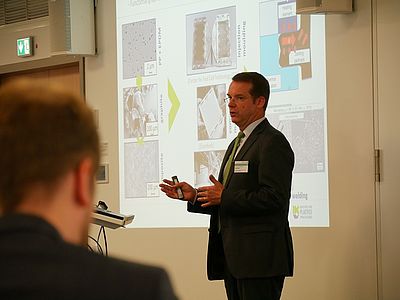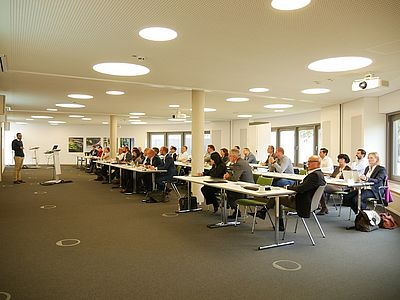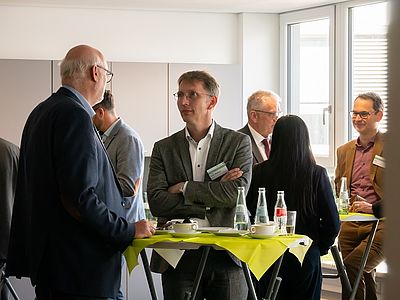In his welcome address, Prof. Dr.-Ing. Christian Hopmann, head of IKV, emphasised the cross-industry significance of plastics as an opportunity for more economical and sustainable technical products. He sees the booming hydrogen economy as an economically and technologically highly relevant field for the plastics industry. He also emphasised that plastics can contribute significantly to increasing the efficiency of systems in the various value chains of the hydrogen economy. "Hydrogen is a topic of strategic importance for us and our partners at RWTH Aachen University and Forschungszentrum Jülich. With the BMBF's Hydrogen Future Cluster, for example, we want to develop our region into the ‘Hydrogen Technology Innovation Valley’ in the long term."
Hopmann presented bipolar plates for fuel cells made of highly filled thermoplastics and the holistic development of high-pressure storage systems as examples from IKV research. "The demanding functionality of components in hydrogen systems is predestined for highly integrated components made of plastic-based material systems. The demanding conditions under hydrogen atmosphere and competing requirements for chemical, thermal and mechanical properties require interdisciplinary cooperation between companies for the implementation. With the project, we provide a marketplace for identifying the relevant research questions and initiating cooperations."
In preparation for the discussion on the results of the project and the next steps, a block of impulse contributions from the consortium followed. The opening was given by Prof. Dr. rer. nat. Rudolf Stauber, who, as the former responsible head of materials technology at BMW AG, is involved with his expertise in the requirements and the processes for introducing materials into cost-sensitive mass applications.
The keynote presentations by the companies 3M Deutschland, AGC Chemicals, ALLOD Werkstoff, BASF, Brabender, Covestro, EBG Group, Freudenberg, Getzner Werkstoffe, HUEHOCO, Klöckner DESMA Elastomertechnik, Lanxess, MOCOM Compounds, TECE, WILO and Yizumi highlighted their respective experiences in the field of hydrogen and specific expectations of the project. The presentations were supplemented by the evaluation of interviews conducted in advance with the project participants. On the one hand, the already extensive expertise of the industrial partners became apparent. On the other hand, it confirmed the assumption that a comprehensive knowledge base is also identified by the partners as the key to realising the development of new materials and technologies for specific hydrogen applications. "The successful technology shift towards hydrogen economy requires a focused approach and clarity about new requirements – both are currently challenging issues." (Dr. Edgar Große Westhoff, Andreas Töws, WILSO SE).
For the systematic assessment of the requirements, it was decided to focus specifically on the identification of the respective OEMs and significant players in addition to the economic and technological potential when segmenting the value chains. "We want to push the plastics industry regarding the hydrogen economy but we also need a pull from the OEMs." (Dr Silke Wagener, Freudenberg Technology Innovation SE & Co. KG).
In addition to the segmentation of the sectors of generation, transport, storage and conversion, various workshops are scheduled next, initially on 8 December 2021 on the topic of "Markets and Regulations".
There is still the possibility to join the currently existing network and to participate in the direction of the project. If you are interested, please get in touch with the contact persons of IKV and write to: H2@ikv.rwth-aachen.de
Further information and registration for the study
>> Information and registration
Contact on the subject of the hydrogen network
Dr.-Ing. Kai Fischer, Scientific Director
Daniel Schneider, M.Sc., Head of the Department Fibre Reinforced Plastics and Polyurethanes
Jens Wipperfürth, M.Sc., Head of the Department Materials and Joining Technology/Additive Manufacturing
h2@ikv.rwth-aachen.de



